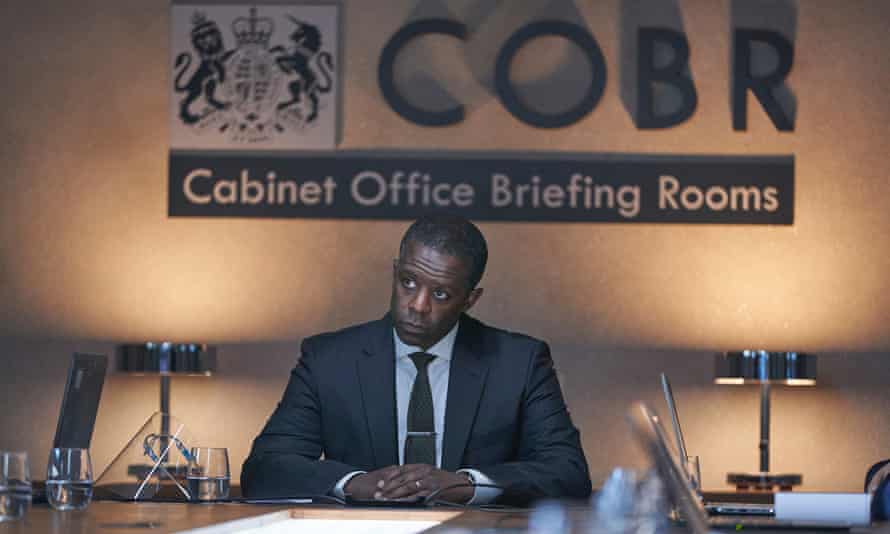Be careful what you wish for, is the abiding message of the first episode of Channel 4’s new drama The Undeclared War.
Be careful what you wish for if you are Saara Parvin (Hannah Khalique-Brown, doing fine work in her first major television role), a superbright graduate who begins her work experience alongside the even superbrighter computer analysts at GCHQ on the very day (in 2024) the country is hit by a cyber-attack from an as-yet unidentified source. “55% of internet provision is down,” says the boss, Danny (Simon Pegg, in a sort of non-cartoon version of his Mission Impossible role). It appears to have targeted non-essential online services and is deemed: “Cleverly targeted for maximum disruption and minimal risk to lives.” Saara, however, proves superbrighterer than all of them and finds a second, hidden virus inside the first one that would have taken care of the other 45% and brought the country to its knees. She gets to sit in on a Cobra meeting – which feels unlikely, but no more unlikely than our own PM not turning up to most of his during a pandemic – but fails to make it to the hospital to see her father before he dies after an apparent suicide attempt.
And you should be careful what you wish for if, like me, you were hoping The Undeclared War would deliver the perfect dose of quality hokum and escapism from the real world as it crashes and burns around us. A cyber-attack? What fun! It doesn’t even come close to making the list of anxieties I work through these days. In fact, if that 55% included the transmission of daily headlines from around the globe, I would welcome it. “Bring on the temporary respite from the burden of awful knowledge!” I would cry.
Alas, The Undeclared War has taken the other route and is clearly designed to induct us all into a new field of worry. Created by the multi-award-winning Peter Kosminsky (who directed the brilliant Wolf Hall) after three years of research into modern intelligence and cybersecurity, the six-part series wears that research heavily and takes itself very seriously indeed.

It moves at a glacial pace and the GCHQ staff have the air of reluctant office workers on data entry shifts, boredly tapping at their keyboards until it’s time for a statutory tea break – rather than people frantically trying to hold off an enemy assault that could kill thousands and hurl the nation back to the middle ages, or at least the 1990s. While I’m sure this is far more realistic than the bullet-sweating heroes Hollywood gives us (although would there really be such audible groans from codebreaking professionals when the boss tells them they have to go back over the malware code?), it doesn’t provide much in the way of dramatic tension.
Kosminsky’s involvement presumably explains the appearance of such heavyweights as Adrian Lester (prime minister Andrew Makinde, who apparently ousted Boris 15 months ago), Alex Jennings (head of GCHQ, David Neal) and – still to come in later episodes – Mark Rylance (John Yeabsley, a former GCHQ asset brought back to help them deal with the attack). At the moment – and only one episode was available for review – they don’t have much to do. The concentration on young Saara’s discovery of the second virus banishes them to the sidelines in much the same way as the grownups were peripheral to an Enid Blyton adventure. It also brings to mind the gentle mockery of her setups by children’s librarian Eileen Colwell – “But what hope has a band of desperate men against four children?” The script, too is Blytonesque. People say “We’re in!” a lot, or “We’re offline!” or “It’s 70% reverse-engineered”, without much in between.
At the moment, The Undeclared War feels like it has aimed high and missed. But with five episodes to go, Kosminsky at the helm and a distinguished cast who, you would have thought, read the whole thing before they signed up, let us hope that drama and insight will both accrue. Maybe we will occasionally leave the static setting of GCHQ and find out how life is going for people without 55% of the internet? If not, it will feel like a rich premise squandered and we will be left hoping for a remake that leans into its potential as a fine contribution to the glossy tech nonsense genre – something we could all do with at this difficult time.




